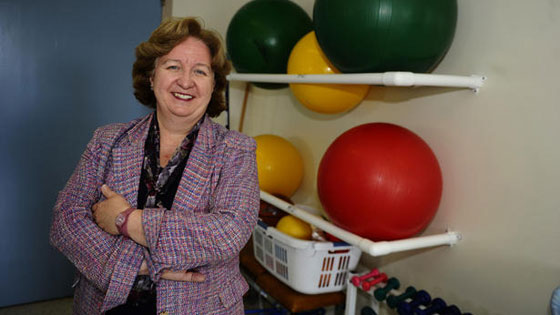
Dr. Julia Alleyne, the Chief Medical Officer of the 2015 Pan Am and Parapan Am Games, has been Canadian team doctor for five Olympic Games, Chief Medical Officer for Skate Canada and physician for the Canadian Trampoline Team. (Photo: Dr. Julia Alleyne)
As a sports medicine physician, Dr. Julia Alleyne is no stranger to the importance of physical activity.
This summer, she will take on a role to care for athletes who are hoping to be at the top of their game: Dr. Alleyne will be the Chief Medical Officer of the 2015 Pan Am and Parapan Am Games.
"Part of my motivation to be part of the Games is the legacy it will leave in Ontario for sports medicine and physical activity," says Dr. Alleyne, who is also the physician lead for Toronto Rehab's outpatient MSK services.
Dr. Alleyne and her team of 11 medical staff and 2,000 clinical volunteers are responsible for overseeing the Games' medical services, ambulances, public health, and drug-testing for all of the athletes. Ontario hasn't hosted multi-sport games since the 1920s, so Dr. Alleyne has been building the medical operations from the ground up since she started the paid, part-time role in 2011.
"Care of the athlete has been very important to me," explains Dr. Alleyne. "I'm interested in understanding the special and unique medical needs of the athlete as they train and compete."
She has been involved with international competitions in a medical capacity for many years as a Canadian team doctor for five Olympic Games, Chief Medical Officer for Skate Canada and physician for the Canadian Trampoline Team.
Toronto 2015 will be the largest international multi-sport event Canada has ever seen, with more athletes and sports than the 2010 Winter Olympics in Vancouver and the Summer Games in Montreal in 1976. Some 10,000 athletes and team officials from 41 countries are expected.
The most common medical issues at multi-sport games are: respiratory infections, gastrointestinal conditions, skin abrasions and musculoskeletal sprains and strains. However, Dr. Alleyne and her team are prepared for trauma, cardiac emergency and mass casualty incidents.
"I am excited about the ability to collaborate with international doctors and therapists from the various countries represented at the Games," says Dr. Alleyne. "It will be very rewarding to welcome international medical professionals and introduce them to our Games health-care services."
A complex part of her role is the coordination of medical services, ambulance service and public health support for the whole Games, which is spread across seven Local Health Integrated Networks, including a large cluster in the Greater Toronto Area.
"The biggest challenge will be to execute proactive, timely responses to every venue and village needs," explains Dr. Alleyne. "The vast geography of the Games makes this such a big challenge. We need to ensure that every athlete gets equal access to care."
Dr. Alleyne joined UHN in July 2013.
"I'm extremely appreciative Toronto Rehab saw a fit for my skills," says Dr. Alleyne. "I'm already using skills from the Games to develop programs at the hospital and work with interprofessional teams."
After this summer, Dr. Alleyne will focus on developing the MSK outpatient programs needed at Toronto Rehab for acute and chronic care, including sport medicine. She will continue to provide leadership to the community rehabilitation program and increase opportunities to liaise with referring family doctors.
"I have a pretty high battery level, but I couldn't do it without the support of my family and work colleagues," says Dr. Alleyne.
